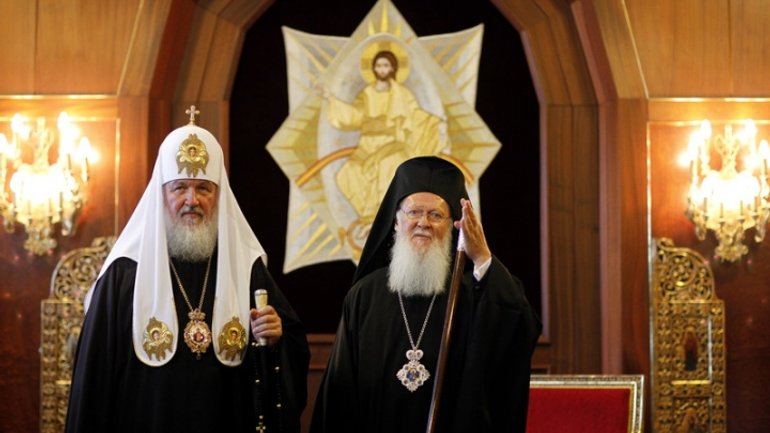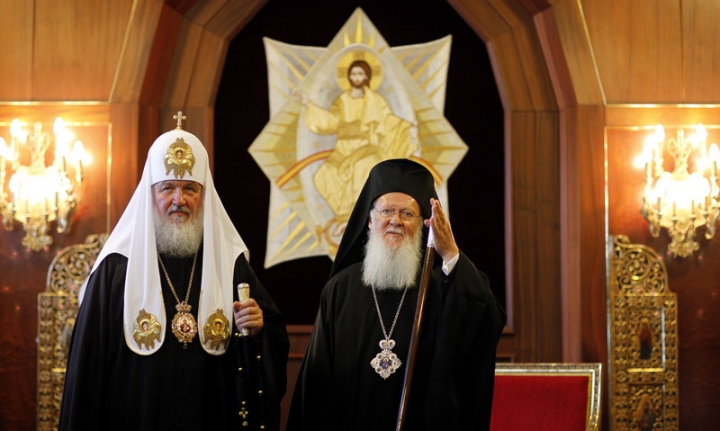ROC responds to news about the meeting of Kirill and Bartholomew I

The Russian Orthodox Church responded to the message of the Ecumenical Patriarchate regarding the upcoming meeting of its Head Bartholomew I with the Head of the Russian Orthodox Church, Patriarch Kirill of Moscow.
The Communications Service of the Department of External Church Relations (DECR) of the Moscow Patriarchate has confirmed the announcement that such a meeting is scheduled for August 31 in Istanbul, Turkey, where the residence of the Ecumenical Patriarch is located, Radio Liberty reports.
In this case, in the message, Patriarch Bartholomew is not referred to as Ecumenical, but his other traditional title, Patriarch of Constantinople. The title of “Constantinople” designates the patriarch as a head of one of almost one and a half dozen mutually recognized, “canonical” local Orthodox Churches, the Church of Constantinople, while the title “Ecumenical” -- omitted by Moscow -- points to his traditional “first-in-honor” status in the Orthodox world and his special powers, including the provision of autocephaly (self-government) to new local Orthodox Churches.
No details of the forthcoming meeting are given, only an account of previous meetings of the two patriarchs, the last of which took place in January 2016.
In an interview with Interfax-Religion, a Russian news agency, Deputy Speaker of the DECR, Mykola Balashov abstained from reporting on the topic of the meeting and only stated that its “agenda is being developed”.
On the evening of August 5, the bureau of the Secretary General of the Holy Synod of the Ecumenical Patriarchate first officially announced this meeting, and its theme was defined as “issues of bilateral interest”. As they paid attention to the Ecumenical Patriarchate, the Patriarch of Moscow will accept a visit at his request.
On the previous day, on August 4th, a hierarch of the Ukrainian Orthodox Church of the Kyiv Patriarchate, Archbishop Yevstratiy (Zoria) of Chernihiv and Kyiv reported -- referring to the Greek Orthodox media -- that during the meeting of the two Patriarchs in late August, a Ukrainian issue will be discussed. “Obviously, the goal of Patriarch Kirill’s visit to Istanbul is either to convince the Ecumenical Patriarch out of making decisions on the “Ukrainian issue”, or at least to achieve their postponement,” he added.
The above-mentioned Greek publication of August 3rd said that the meeting -- in which the Russian side expressed interest -- would “focus on the hottest issue of the Ukrainian autocephaly.”
A brief report mentions the complicated relationship between the two Patriarchates through events in Ukraine and added that the result of the meeting of the Patriarchs is difficult to predict.
On April 19, the Ukrainian Parliament voted for a resolution to appeal to the Ecumenical Patriarch Bartholomew I on the provision of the Tomos of autocephaly to the Orthodox Church in Ukraine. A few days later, Ukrainian President Petro Poroshenko said that the Ecumenical Patriarchate had initiated the procedures necessary to grant autocephaly to the Ukrainian Orthodox Church.
Patriarch Bartholomew I and the Ecumenical Patriarchate have recently stated that the transition of the Kyivan Metropolis to the ecclesiastical subordination of the Moscow Patriarchate proceeded in a non-canonical manner at that time, and that the Ecumenical Patriarchate, not Moscow, is the Church-mother for Orthodox Christians in Ukraine.
In July, Patriarch Bartholomew I issued a statement saying that the ultimate goal of the Ecumenical Patriarchate is to grant autocephaly to the Ukrainian Church.
The Russian Orthodox Church and its current Ukrainian branch, the Ukrainian Orthodox Church in association with the Moscow Patriarchate, are opposed to such a scenario that will result in the loss by Moscow of significant levers of influence on social life in Ukraine.









